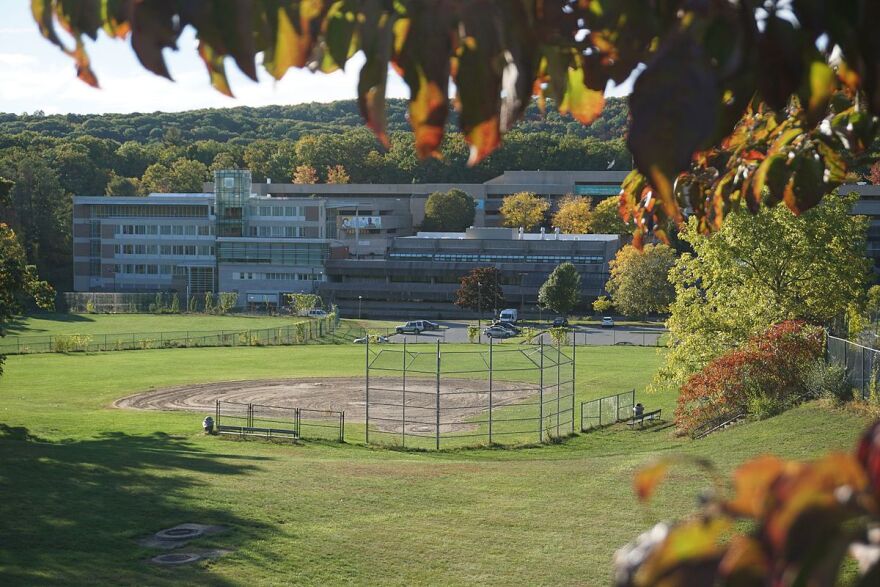Hate groups are on the rise in the U.S. and they increasingly see college campuses as prime recruiting ground.
UMass Amherst and Holyoke Community College are just two of dozens of college campuses to have been targeted by white nationalist propaganda in recent months. But finding the right way to respond to these groups can present a challenge to college administrators.
"It's important for leadership on campuses to make it very, very clear that their campuses do not represent these views, and these kinds of views are not welcome on their campus." - Robert Trestan, Anti-Defamation League
The fliers that appeared recently in a parking lot at UMass Amherst and on bulletin boards at Holyoke Community College showed black and white photos of European statues -- like Michelangelo's David -- with slogans like “let’s become great again” and “protect your heritage.”
AMHERST WIRE: White nationalist fliers appear in UMass parking lot
It’s the white nationalist group behind the fliers that has the schools concerned. They call themselves Identity Evropa, require members to be of European, “non-semitic” heritage. They take extreme views on immigration and promote pseudo-scientific theories about differences between races.
“Many of these groups are feeling emboldened by the current political climate and they are using the environment as a way to attempt to recruit college students," said Robert Trestan, the regional director of the Anti-Defamation League.
The organization recently issued a report showing white nationalist groups have scaled up their recruiting efforts at colleges and universities. Racist, anti-semitic and anti-Muslim fliers have been found on more than 100 campuses across the country since last fall.
“It’s important for leadership on campuses to make it very, very clear that their campuses do not represent these views, and these kinds of views are not welcome on their campus," Trestan said.
But how schools choose to respond can raise concerns too, according to Azhar Majeed, with FIRE -- the Foundation for Individual Rights in Education, a free speech watchdog group.
“What I hope not to see on college campuses, is for universities to respond by saying certain types of speech, even though they’re protected by the First Amendment, will be subject to censorship or punishment," Majeed said.

Finding a balance between rejecting discrimination while allowing for free speech is exactly what Holyoke Community College faced when fliers appeared on its campus this month.
“Some students are very concerned about how safe this campus is for them, especially students who belong to underrepresented group that are being targeted by these organizations," said Yanina Vargas-Arriaga, the college’s vice president for student affairs. "And other students are concerned about whether we’re going to be taking an approach where we’re going to be silencing ideas.”
Ultimately, Holyoke Community College decided to address the incident with a school-wide email from the college president, which outlined a commitment to diversity and respectful exchange of ideas. Vargas-Arriaga said HCC also plans to host events on campus to reiterate those messages.
"There is a balancing act. You want to denounce -- absolutely -- the message, but you don't want to create so much public notice that you're advancing that agenda." - Ed Blaguszewski, UMass spokesman
And colleges around the country facing these situations have had a range of reactions.
When white supremacist fliers were left outside the offices of African American faculty at Indiana University, the school notified the FBI. The president of UT Austin hosted a town hall meeting in response to anti-Muslim fliers that appeared at that school.
At UMass Amherst, the student affairs office reached out privately to multicultural groups on campus. UMass spokesman Ed Blaguszewski said university leadership considered the group that left the fliers probably wanted to get attention and create controversy.
“There is a balancing act," he said. "You want to denounce -- absolutely -- the message, but you don’t want to create so much public notice that you’re advancing that agenda.”
At both UMass and Holyoke Community College, most of the fliers were left in places where fliers aren’t allowed to be posted, regardless of content, so they were quickly removed. Neither school knows who posted them, either.
And Vargas-Arriaga said there’s a big difference between that kind of messaging, and students backing up their own ideas and presenting them respectfully.
“Anonymous speech has no standing in our community, but when you stand behind your thoughts and your ideas, then we will sit down and engage," she said.
Exchanging ideas, Vargas-Arriaga said, is what college is all about.


